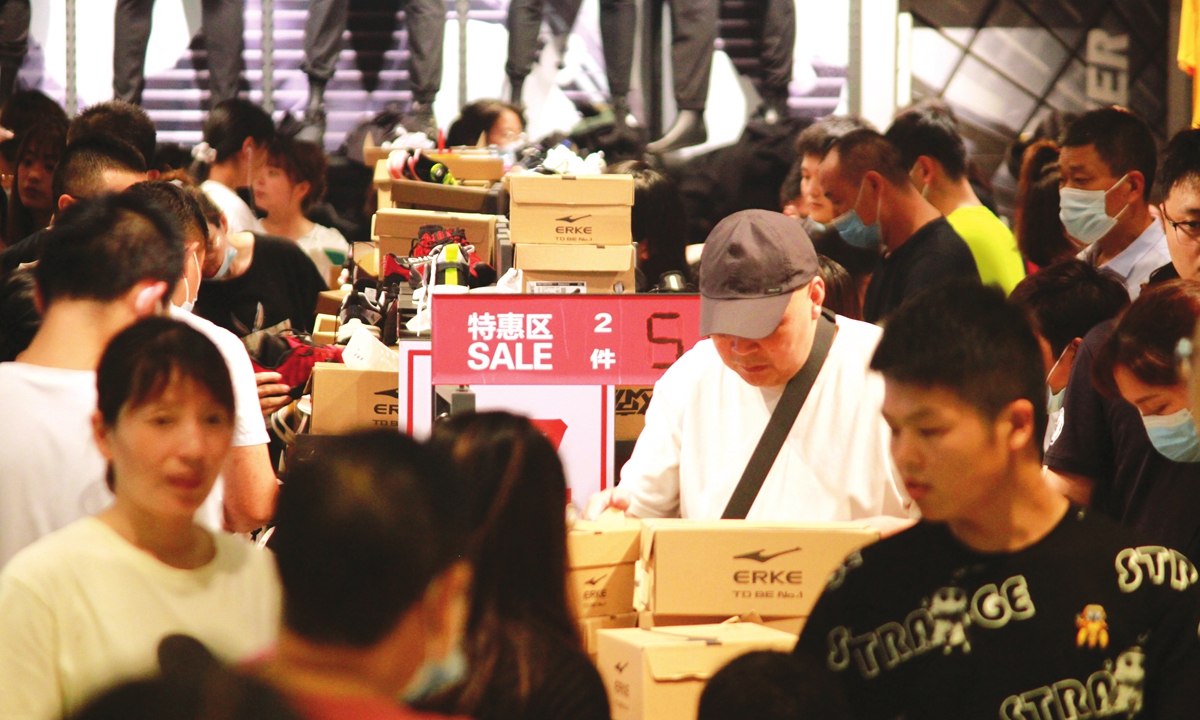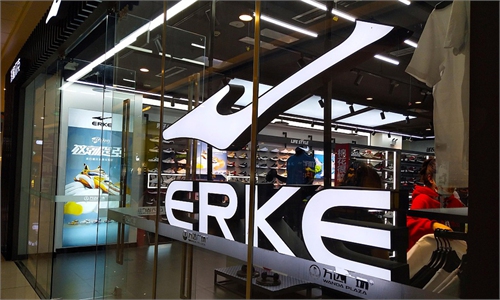
Customers visit an Erke store in Changzhou, East China's Jiangsu Province, on July 25. Photo: cnsphoto
A group of small Chinese domestic brands' generous but low-profile donations to help flood relief in Central China's Henan Province set off a round of "crazy consumption," underscoring a trend toward embracing home grown business.Erke, a sportswear company based in Xiamen, East China's Fujian Province, came under the spotlight overnight after netizens learned that the company announced a generous donation of 50 million yuan to help with flood relief in Henan.
Erke posted an urgent notice on Thursday morning that a sudden surge in orders has resulted in the collapse of its system. Products in its warehouses across the country have been sold out and major production lines are running above capacity.
Currently, Erke's flagship store on Alibaba's e-commerce market place Tmall has postponed shipment to as late as August 15, while also forced to halt sales via livestreaming as consumers spontaneously rush into its online and offline stores to buy goods.
Data from e-commerce platform JD.com showed that Erke's sales soared 52 times in July, while the number of audiences watching its livestreaming on Taobao surged 4,000 times to nearly 20 million on July 24.
Days of torrential rain and subsequent floods in Henan have killed 99 people and led to direct economic loss of 90.9 billion yuan ($14 billion), official data revealed on Thursday.
A Beijing resident surnamed Huang told the Global Times on Thursday that she bought three Erke items including a pair of sneakers and two t-shirts to show support. "In a stark contrast to other apparel stores, many customers choose products at the Erke store I went to, with some sizes already sold out," Huang said, praising the good quality of Erke products.
In addition to Erke, other local labels such as sportswear brand K-bird, Baixiang Instant Noodle and Huiyuan Juice also won domestic consumers' support for their acts of generosity during the floods.
Shanghai-listed K-bird, which has been given A-share special treatment (ST) due to losses for a consecutive of three years, rose by the daily limit of 5 percent for the fourth straight day on Thursday to 3.21 yuan per share. The company is now worth 5 billion yuan.
Similar to Erke, netizens have been rushing to K-bird's livestreaming space to buy their products, after it was reported that the debt-ridden firm, which by some estimations only had 22.68 million yuan on hand, donated money and products worth 40 million yuan to Henan.
Rise of home-grown brands
The recent trend of small domestic brands accidentally becoming internet memes is beyond expectation. The phenomenon reflects Chinese national and cultural pride, boosted by China's economic miracle and its rising global influence, Yan Qiang, a partner with Beijing-based Hejun Consulting, told the Global Times on Thursday.
The rise of home-grown brands is irreversible, and any incident could be a marketing opportunity for local brands, he said, noting that there is huge growth room for domestic brands.
In fact, escalating China-US trade and political tensions have accelerated the trend of embracing domestic brands.
According to a survey conducted by the Global Times on around 1,300 respondents from 12 major cities across the country in March, more than half held a preference toward domestic brands.
Approximately 43 percent of the respondents believe local brands offer good quality and relatively lower prices, while nearly 70 percent of the respondents - especially younger ones - think that home-grown brands' combination of modern fashion elements with traditional Chinese culture sparks their willingness to purchase.
Foreign brands' rejection of Xinjiang cotton in April harmed their reputation and image among Chinese consumers, giving a further boost to the rise of home-grown brands.
For example, Swedish fashion retailer H&M saw its sales in the China, one of its top 10 markets, plummet 28 percent year-on-year in Swedish krona terms in the second quarter of this year.
"The growth of home-grown brands is expected to redefine 'Made in China' brand," Yan said, noting that domestic brands are integrating Chinese culture and high-tech elements, while marketing their products via a variety of channels supported by 5G and artificial intelligence.
Compared with their international competitors, domestic labels such as sportswear company Li-Ning have achieved breakthroughs in aesthetics and innovation, attracting a large number of younger consumers, but overall Chinese brands need to make improvement in high-end transformation, sales channel optimization and after-sales services so as to compete with international brands, he said.

